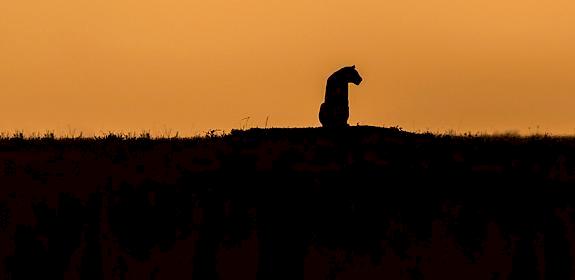The role of Indigenous Peoples and Local Communities in combating illegal wildlife trade
Limbe, Cameroon, July 2016—The often neglected role of Indigenous Peoples and Local Communities (IPLCs)—the people often most heavily impacted by wildlife poaching and associated crime—was the focus of a meeting held in Limbe this February.
As governments around the world prepare for the Seventeenth meeting of the Conference of the Parties to the Convention on International Trade in Endangered Species of Wild Fauna and Flora (CITES CoP 17) and the questions on how to foster support of local people for conservation, a new report sheds light on the need for IPLCs to be a key part of the strategies to combat illegal wildlife trade.
Globally, poaching and associated illegal wildlife trade is devastating populations of iconic wildlife species such as rhinos and elephants, as well as a host of lesser known ones. Across West and Central Africa, wildlife crime is impacting elephants, timber, great apes, pangolins, birds, reptiles and medicinal plants.
However, despite high-level recognition of the problem, the emphasis in solutions to date has been largely on strengthening law enforcement efforts and reducing consumer demand for illicitly sourced wildlife commodities. Considerably less emphasis has been placed on the role of the Indigenous Peoples and Local Communities who live with wildlife.
Yet illegal wildlife trade has an enormous impact on such people, who are affected by insecurity and the depletion of important livelihood and economic assets, while often being excluded from the benefits of conservation. They can also be very negatively affected by heavy-handed, militarized responses to wildlife crime that frequently make little distinction between the illegal activities driven by large scale profits—crimes of greed—versus those driven by poverty—crimes of need.
“For too long the voices of those who hold the key to solving the poaching crisis have not been heard,” said Rosie Cooney, Chair of IUCN's Sustainable Use and Livelihoods Specialist Group. “This meeting aimed to address that and provide a platform for those at the grassroots level to speak up to protect their livelihoods and their futures from the treats posed by illegal wildlife trade.”
Meeting delegates included a representative from the Alliance of Indigenous Peoples of the Congo Basin Forest, who highlighted how indigenous peoples were often drawn into illicit activity by those higher up the chain because of their special skills and knowledge, but were the ones most targeted by enforcement. He raised the need for effective initiatives against IWT to increase the social and economic benefits from conservation for IPLCs, including through sustainable management of wildlife resources.
“There is a clear need to raise awareness of examples where sustainable use of wildlife benefits local communities and engages them in conservation and protection against outsiders who would exploit these assets for their own gain,” said Roland Melisch, Senior Director for Africa and Europe at TRAFFIC.
Strong themes throughout the meeting were the role that Indigenous Peoples and Local Communities have in overseeing natural areas and being on the lookout for criminal activity, and the need to make conserving nature more rewarding to them than colluding in illicitly exploiting it. This is fraught with difficulties, but many examples illustrated the failures that result where IPLCs are not engaged and supportive of conservation efforts.
“Without assistance from local communities to curtail wildlife crime, even the most focused and well-resourced enforcement efforts will struggle to contain wildlife crime effectively,” said Dilys Roe, leader of the International Institute for Environment and Development's Biodiversity team.
The meeting was held under the auspices of the IUCN CEESP/SSC Sustainable Use and Livelihoods Specialist Group (IUCN SULi) and Regional Programme for West and Central Africa (IUCN PACO), International Institute of Environment and Development (IIED), TRAFFIC, and the Network for Environment and Sustainable Development in Africa (NESDA – Cameroon).
The workshop reports are available in English (PDF, 1.4 MB) and French (PDF, 1.5 MB).
Interested in the work stream on “Beyond Enforcement”? You can find further information on this work stream on the SULI site here
ENDS
This workshop was made possible through the generous support from three governments:
German government support was received through the Polifund project, implemented by GIZ on behalf of German Federal Ministry for Economic Cooperation and Development (BMZ) and the German Federal Ministry for Environment, Nature Conservation, Building and Nuclear Safety (BMUB). Polifund combines the expertise and resources of five federal German ministries, international organisations and NGOs to combat poaching and the illegal trade in wildlife products (ivory and rhino-horn) in Africa and Asia.
Austrian Government funding support was received from the Ministry of Environment.
Co-support for the workshop was provided by the Wildlife TRAPS (Trafficking Response, Assessment and Priority Setting) Project implemented by TRAFFIC and IUCN, and funded by the United States Agency for International Development (USAID).





